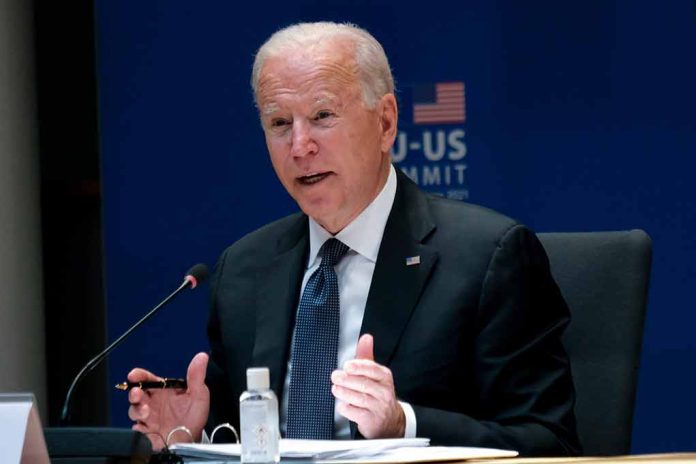
President Biden requests a staggering $100 billion for hurricane recovery, leaving many to wonder about the extent of the devastation and the potential impact on the nation’s budget.
At a Glance
- Biden seeks $100 billion in emergency funding from Congress for recent natural disasters
- Funding primarily targets FEMA and the Agriculture Department, with requests for 16 other agencies
- Hurricanes Helene and Milton caused over 200 deaths and significant damage
- FEMA Administrator reports a 50% increase in disaster activity compared to the previous year
- Request follows previous $20 billion approval after Hurricanes Milton and Helene
Biden’s Unprecedented Request for Disaster Relief
In a move that has raised eyebrows across the political spectrum, President Biden has called on Congress to approve a mammoth $100 billion emergency relief fund. This request comes in the wake of the devastating Hurricanes Helene and Milton, which wreaked havoc across Florida, South Carolina, and Georgia, leaving a trail of destruction and loss of life in their wake.
The proposed package is not just a response to these recent hurricanes. It encompasses a broader range of natural disasters that have plagued the nation, including fires in Maui, Midwest tornadoes, and the collapse of the Francis Scott Key Bridge in Baltimore. The sheer scale of the request reflects the unprecedented nature of the disasters faced by the country in recent months.
President Joe Biden on Monday requested from Congress about $100 billion in disaster relief funding. https://t.co/pb4oFULSXk https://t.co/pb4oFULSXk
— Forbes (@Forbes) November 18, 2024
Breaking Down the Billion-Dollar Request
The lion’s share of the funding, approximately $40 billion, is earmarked for FEMA’s disaster relief fund. This substantial allocation underscores the critical role FEMA plays in immediate disaster response and recovery efforts. Another significant chunk, $24 billion, is requested for the USDA to assist farmers and support school lunch programs and food banks in affected areas.
The request also includes $12 billion for HUD’s Community Development Block Grant Disaster Recovery program, demonstrating a commitment to long-term rebuilding efforts. Additional funds are sought for various other departments, including the EPA, Energy, Transportation, and Health and Human Services, highlighting the wide-ranging impact of these disasters on multiple sectors of society and the economy.
A Year of Unprecedented Disasters
FEMA Administrator Deanne Criswell described 2024 as “a year of records,” noting a staggering 50% increase in disaster activity compared to the previous year. This dramatic uptick in natural disasters has put an unprecedented strain on federal resources, leading to projections of a shortfall in disaster relief funding since the beginning of fiscal year 2023.
The request for $100 billion comes on top of a previous $20 billion approval following Hurricanes Milton and Helene. This rapid succession of massive funding requests raises questions about the long-term sustainability of such emergency spending and its impact on the national budget.
Congressional Response and Historical Context
House Speaker Mike Johnson has stated that the House will evaluate Biden’s request and ensure support for hurricane victims. However, the sheer size of the request may lead to intense debates in Congress, particularly given the current focus on fiscal responsibility among many conservatives. “Take immediate action,” Biden urged Congress, stressing the need to “provide for an expeditious and meaningful federal response to Hurricanes Helene and Milton and other natural disasters.”
Historically, Congress has approved significant disaster relief funding, including $90 billion after Hurricane Katrina and more than $120 billion after Hurricanes Harvey, Irma, and Maria. However, the current request’s magnitude, coupled with concerns about inflation and the national debt, may lead to a more protracted approval process.
As the nation grapples with the aftermath of these devastating natural disasters, the coming weeks will likely see intense discussions about the appropriate level of federal response and the long-term implications of such massive emergency spending.
Sources:
Biden asks Congress for about $100 billion in disaster relief funding
Biden Asks Congress for Nearly $100 Billion in Disaster Aid
Biden Asks Congress for Nearly $100 Billion in Disaster Aid













